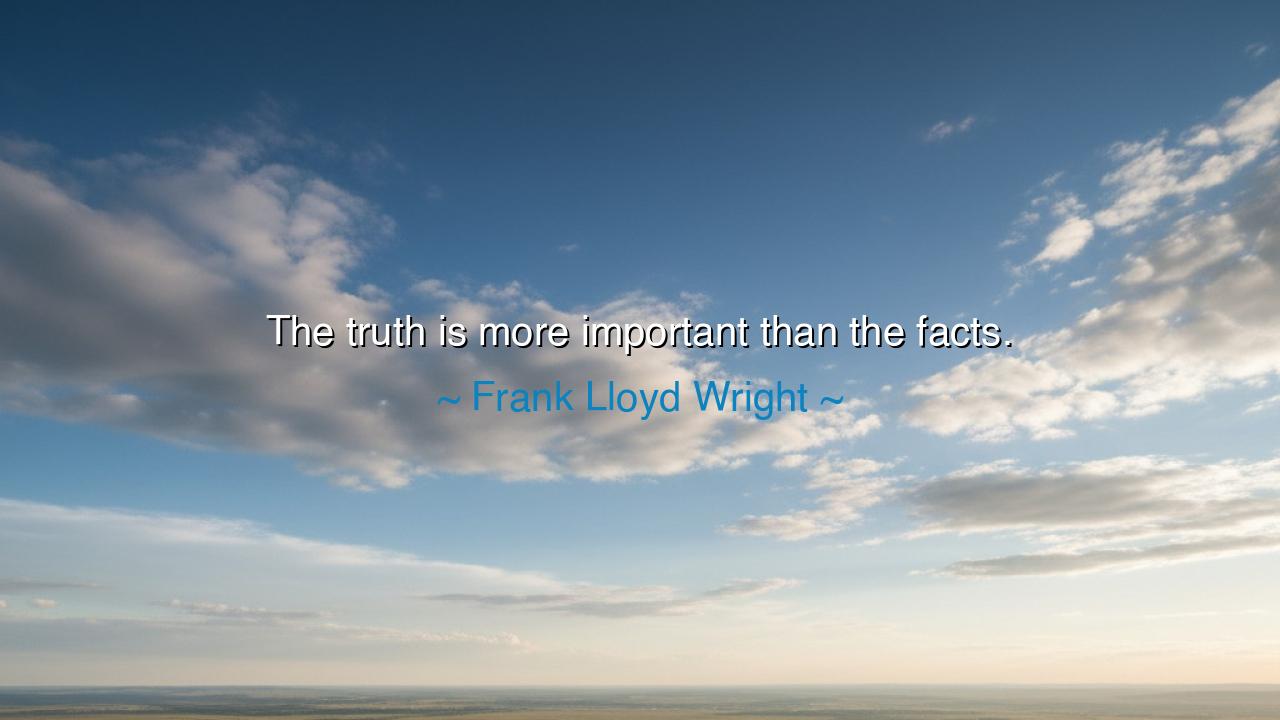
The truth is more important than the facts.






Frank Lloyd Wright once spoke with piercing simplicity: “The truth is more important than the facts.” In this statement lies a wisdom that reaches beyond architecture and into the very foundations of human existence. For facts are the stones scattered on the ground—cold, detached, and isolated. But truth is the temple built from those stones, infused with purpose, meaning, and harmony. Facts tell us what is, but truth tells us what matters.
Wright, an architect of daring vision, understood that buildings could not simply be assembled from bricks and beams—they had to embody life, spirit, and humanity. In the same way, human beings must not mistake the fragments of information they collect for the whole of reality. Facts can deceive when taken in isolation; they can be twisted to tell a thousand stories. But truth, though harder to grasp, binds those fragments together into a deeper, unshakable reality.
History shows us this clearly. Consider Abraham Lincoln during the American Civil War. The facts were brutal: tens of thousands dead in single battles, the Union divided, the nation bleeding. Some argued the facts proved the war was hopeless. But Lincoln saw the truth—that the survival of liberty and the end of slavery were worth enduring the trial. Facts alone could not sustain the people; truth gave meaning to their sacrifice. Without truth, the facts of bloodshed would have been unbearable.
So too in the life of Galileo. The facts of his telescope revealed moons orbiting Jupiter. The scholars of his time rejected those facts, yet the truth of his discovery endured. Here we see the paradox: facts may be denied, ignored, or even hidden, but truth—though resisted—remains eternal, waiting for the world to catch up. Thus Wright’s words remind us: never cling to facts without seeking the deeper truth they point toward.
The quote also challenges us personally. We may gather facts about our lives—the size of our homes, the digits in our accounts, the titles we bear. Yet these do not reveal the truth of our existence. The truth lies in how we live, how we love, what we give, and what meaning we draw from our days. A life rich in facts but poor in truth is like a house built without light—solid, perhaps, but lifeless.
The lesson is clear: do not mistake the surface for the essence. Facts are tools, but truth is the purpose. The wise use facts to build toward truth, while the foolish stop at the facts and are left with fragments. As Wright built houses that seemed to grow out of the earth itself, so too must we build our lives upon truths that grow out of the soul, not upon the shifting sands of mere detail.
In practice, this means seeking the meaning behind the numbers, the essence behind the appearances. When confronted with information, ask: “What greater truth does this serve?” When facing hardship, look beyond the fact of suffering to the truth of what it can teach, strengthen, or reveal. In your own speech, do not merely report facts—speak words that carry truth, that lift others, that guide hearts.
Thus remember Wright’s decree: “The truth is more important than the facts.” For facts will pass like shadows, but truth endures like the sun. Seek truth in your art, your work, your love, your life. If you live by facts alone, you will count the days; if you live by truth, you will make the days count.






DADuc Anh
What if facts are just pieces of a larger puzzle, but the truth is the bigger picture? This quote suggests that sometimes, our obsession with facts can blind us to the more important underlying truths. I wonder if this idea applies not only to history and storytelling but also to our personal lives. Do we get too caught up in 'the facts'—like dates, figures, and events—and miss the emotional or spiritual truths that are at the heart of the experience?
VTnguyen viet tien
This quote resonates with me because it suggests that facts alone don’t always convey the full picture. For instance, we often hear about events or decisions presented as facts, but without understanding the motivations, emotions, or deeper truths behind them, we may not grasp the complete reality. Can we say that facts sometimes obscure the truth rather than reveal it? How often do we find that the 'truth' in a situation is more about the story and feelings than the technical facts?
CNNguyen Chi Na
Frank Lloyd Wright’s perspective makes me reflect on situations where facts can be misleading or incomplete. Sometimes, what we think are facts can be twisted or manipulated to serve an agenda, but the truth remains more nuanced and powerful. Is it possible that in some cases, the pursuit of truth—however complex—leads us to a more meaningful understanding than simply relying on facts alone? Could we be missing the bigger picture by focusing solely on the facts?
ADHoai anh Duong
I find this quote thought-provoking because it seems to push back against a world where facts are often considered absolute. But truth can be subjective, and it’s shaped by context and perception. Are there times when facts, though accurate, don’t capture the full truth of a situation? For example, in storytelling, the facts might be technically correct, but the deeper emotional truth of the story might be more impactful than the facts themselves.
HNHan Nguyen
This quote really challenges my usual understanding of truth and facts. Facts are concrete, measurable, and often seen as the ultimate foundation for understanding the world. But here, Wright seems to be suggesting that truth goes beyond mere facts, perhaps implying that the emotional or philosophical essence of a situation matters more. Can the truth of a situation sometimes be more about perspective than just the raw facts we have? What do we lose when we prioritize facts over truth?